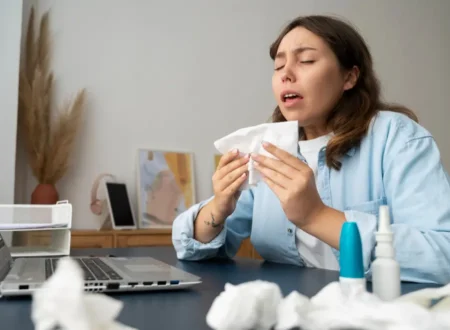What is an Allergy?
When a person’s immune system reacts to a dangerous substance in the environment, they develop an allergy. For example, when you come across pollen, you might get an allergy due to the particles and reactions that take place inside the body.
In this article, we will know how allergy reacts to our body, how it cause issues and problems for us, its symptoms, types and how can we prevent form it.
How does allergy react to our body?
Let’s take an example of pollen, you come across the pollen, and the tiny particles enter your body through the nose. The immune system (which plays a major role to protect the body from any kind of bacteria) will eventually take the position and start the reaction with the allergen (a term used for a substance that causes allergy, in this case, pollen is an allergen).
When the allergen enters the body, the cells will react with the allergen and produces antibodies. These cells produce special chemical name histamine as a reaction. The chemical will react with the mast cells (white blood cells) and attract the allergen towards it like two opposite magnetic pole attracts each other. In this way mast, cells produce allergies in the body.
Causes of Allergy

There are many causes of allergies, some main causes are
- Pollen
- Animal dander
- Dust miles
- Certain foods
- Bee sting
- Certain medicines
- Latex
Type of Allergy reaction
Allergy reactions start when the allergen enters your body, but there some take more or less time to show the symptoms of a reaction.
1. Immediate reaction
Symptoms appear just in a few seconds to minutes. Symptoms include difficulty in breathing, swelling, low blood pressure, and shock
2. Cytotoxic
Symptoms appear after minutes or hours. IgE antibodies damage cells by activating the complement system of the immune system.
3. Immune complex-mediated
Symptoms sets in several hours. Immunocomplexes (antigen-antibody complexes), which are created when IgM and IgG antibodies interact with allergens.
4. Delayed Hypersensitivity
Symptoms sets in hours to days. It is usually found in long-term infectious diseases.
Symptoms of Allergy

- Mild symptoms include any type of rashes, itching, red eye, and watery eyes.
- Moderate symptoms like itchiness, swelling, and trouble breathing.
- Anaphylaxis a serious type of allergy caused by insect stings or food poison. Symptoms include swelling, trouble breathing, issues in the throat, dizziness, and low blood pressure.
Prevention
There are multiple ways to protect yourself from allergies. Some of the general terms are
- Avoid the things which can harm you. For example, if you have a serious problem with pollen stay away from it.
- Track the record of yourself, what you eat, and where you have been, so in case you got an allergy in the future, you can know some of the past highlights of what you did.
- Wear a mask, be moisturized, and always keep yourself clean and hygienic.







